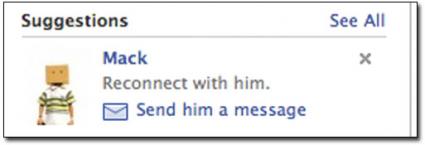Future Now
The IFTF Blog
Google buzz wasn't invasive—just persuasive!

This past weekend saw Google on the defensive over Google buzz, their Twitter-like micro-updating service. Last week all Gmail users had buzz integrated into their accounts with a pre-built list of contacts drawn from Gmail chat buddies and people most frequently emailed. Therein lies the heart of this hubbub, the presumption that users would want to follow the real-time goings-on of this same selection of people. This decision was either incredibly brazen—say, to jumpstart usage in yet another new sharing service by pre-populating it with activity—or just off-kilter, perhaps indicative of an more open 21st century privacy norm emerging from the shared mindset here in Silicon Valley.
But what if there was another rationale, albeit unlikely but suggestive—what if Google buzz was persuading us to re-evaluate our relationships?
Google buzz automatically added my ex to my "follow" list, probably still my most-emailed contact even after a year of relative silence. Much has already been written about breakups in the networked age, and I went through the same process—de-coupling on Facebook, Twitter, Flickr, FourSquare, Dopplr, and on. (Facebook un-friending soon needed the harsher blocking when his trails of activity kept leaking into my view via mutual friends).
My stomach sunk when I first saw the ex's updates listed in my Google buzz feed, and my immediate reaction was the same disbelief that Google would assume past is prologue for their own gain. But my discomfort became tolerance and then something akin to gratitude. I've been avoiding those first steps—like knowing about the ex's life again—to reboot the friendship, and Google buzz threw me into the deep end of this re-immersion. Turns out to be just what I needed.
So while this was a decently happy accident, what if this bug could be a feature?
What would technologies look like that took a proactive role in managing and growing our relationships?

Facebook's Suggest feature is already a crude version today, pairing a randomly chosen friend with one of a few standard suggestions ("Write on his wall!") for engaging. Certainly this is self-serving, as activity on the site ultimately equals ad revenue, but I'll occasionally follow through on one of these suggestions. And if you doubt that interfaces are persuasive, how many birthdays were missed when Facebook moved reminders below the digital fold?
So imagine: a service like Plinky (the provocation-a-day service suggesting a topic to blog or tweet about) that would offer up new ways to bond with friends and family.
Or going further, imagine: a Twitter add-on that would ping you to intervene with contacts when their tweets use negatively-tinged words (could this have saved Alexander McQueen?), or a similar call when their FitBit flower isn't doing so well.
Might we walk down the street in the future with an augmented-reality "ice breaker" filter turned on, projecting suggestions for conversation with strangers based on overlapping interests?
These ideas barely scratch the surface. What others come to mind? We'll keep exploring this in our ongoing work on the Future of Persuasion.
![]()



